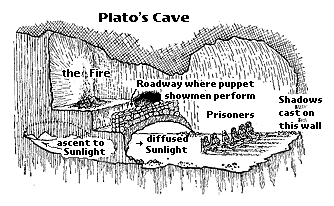G. E. Moore tries to prove the existence of the external world. He acknowledges the argument that one cannot be certain that one is, for instance, standing: one can be merely dreaming that they are standing, being deceived by their senses. Since you can’t know that you’re not dreaming, you can’t know that you’re standing. It seems simple enough, but Moore refutes this. He argues that he knows that he is standing. Since he knows that he is standing, he can say that he knows that he is not dreaming. He says the problem is solved, as it makes just as much sense to say he knows he’s not dreaming because he knows he’s standing as it is to say he doesn’t know if he’s standing because he doesn’t know if he’s dreaming.
I disagree with Moore’s argument. Quite simply, how does he know he is standing? That is what he bases his proof on, yet he can’t prove how he knows it. Frankly, Moore’s argument seems like a feeble attempt at trying to prove that the external world exists when in reality he knows he can’t be sure. He justifies that he is not dreaming by claiming to know something, but he cannot justify his knowledge with anything but his senses. And senses are not always reliable.
Plato’s allegory of the cave proves that senses are not always reliable.
In the allegory, there are prisoners in a cave facing the wall. They are chained and cannot look behind them. Behind them is a fire, so that when they look at the wall, all they see are shadows. Say there is a small cat that is behind them. The cat would cast a very large shadow and perhaps it would seem to the prisoners that something very large was in front of them about to attack them. However, their sense of sight would be deceiving them. There is just a cat behind them, and nothing large and dark in front of them, as the shadow would suggest.
In the same way, our senses can deceive us by making us think we are standing, when we are in actuality hallucinating or dreaming that we are standing, for instance. Moore claiming that he is certain that he is standing does not invalidate any of these claims. It just raises more questions. Sure, it would be easy to assert that everything we experience is the truth, but without justification, we cannot assert this. Though it is a valid argument that works in theory, it does not work in practice. If we are being deceived by our senses, it is certainly an unsound one.
Though Moore proposes a valid argument encouraging certainty, I stand by Descartes, as I do not believe that Moore has anything he can use to back up his claim that he is certain that he is, for example, standing. If we cannot be certain, it remains that we should be uncertain about whether or not we are truly standing or living in this external world we experience. It is an “unsure until proven innocent” approach, as I do not think that we are necessarily being deceived, just that we should be uncertain about it. Though this limbo and unsure state of mind is not ideal, it is all we have to work with until a better argument is made against it.
Sources:
Certainty by G.E. Moore
http://www.deanza.edu/faculty/ramireztono/phil01/moore.pdf
https://faculty.washington.edu/smcohen/320/cave.htm
I love the correlation that you make between Moore’s work and Plato’s Allegory of the Cave. I think it is a great example to refute Moore’s argument about certainty. Going off of this week’s lectures and the readings, we can see how Moore constructs a valid argument to discuss certainty. Although he agrees with the first premise, If I don’t know that I’m not dreaming, then I don’t know that I am standing, he uses Modus Ponens to shift the burden of proof to the skeptic. He poses the question: How can a person appeal to their memories? By bringing in Plato’s argument into the mix, you show how our sensory experiences can be deceiving. For example, just because you “believe” that you have hands, does not make it true. What evidence could you show that you have hands, other than holding them up? For all we know, it could be a visual experience, or that you may be dreaming that you have hands. For me, personally, I found this to be a struggle, because how can we know we aren’t dreaming right now?